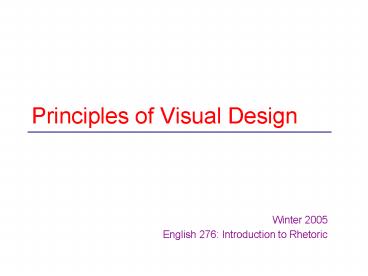Principles of Visual Design - PowerPoint PPT Presentation
1 / 19
Title:
Principles of Visual Design
Description:
These may be bullets, design elements, images, colors, lines, fonts, etc. ... Lucinda Calligraphy. Good Design Is As Easy. As 1-2-3. 1. Learn the principles ... – PowerPoint PPT presentation
Number of Views:331
Avg rating:3.0/5.0
Title: Principles of Visual Design
1
Principles of Visual Design
- Winter 2005
- English 276 Introduction to Rhetoric
2
Contrast
- If two items are similar but not exactly the
same, make them different, very different. - Strong contrast adds visual interest to a page,
attracting the readers eye. It can create a
focal point. - Contrast helps organize information through
heads, subheads, etc. - Contrast can be used in type, rules, colors,
spacing, graphic size and more.
3
- typeface
4
- typeface
5
TYPE
- face
6
Repetition
- Repeat some aspect of the design throughout the
entire piece. - These may be bullets, design elements, images,
colors, lines, fonts, etc. - Repetition unifies all parts of the design and
creates consistency as well as visual unity. - Repetition controls the viewers eye.
- Repetition organizes into visual units.
- Repetition adds visual interest.
7
Repetition
8
Alignment
- Nothing should be placed arbitrarily.
- Every item should have a visual connection with
something else on the page. - Align elements along hard vertical edges.
- Centered alignment is formal, ordinary, and dull.
- Alignment connects and unifies elements on a
page.
9
Rule of Thirds
- Mentally divide the area of the picture or frame
into thirds, with two vertical and two horizontal
lines - Compose your picture around the nine areas and
four intersections.
Source http//www.seittipaja.fi/data/Photography_
lessons/Composition/Lesson_1/_The_Rule_of_Thirds.h
tml
10
Positioning by intersection
Source http//www.seittipaja.fi/data/Photography_
lessons/Composition/Lesson_1/_The_Rule_of_Thirds.h
tml
11
Positioning by line
Source http//www.seittipaja.fi/data/Photography_
lessons/Composition/Lesson_1/_The_Rule_of_Thirds.h
tml
12
Positioning with space
Source http//www.seittipaja.fi/data/Photography_
lessons/Composition/Lesson_1/_The_Rule_of_Thirds.h
tml
13
Proximity
- Group related items together.
- Elements not related should not be in close
proximity. - Grouping causes items to become one visual
element. - Make sure there is sufficient white space between
grouped elements.
14
Got proximity?
15
Match the color to the message
- Colors have emotions associated with them.
- Red excitement, rage passion
- Green comfort, peace
- Orange warmth, happiness, vitality, strength
- Grey classic, timeless, quality
- Yellow happy, sunny
- Blue calm, peace, restful
- White classic, refinement, purity, cleanliness
- Black power, elegance, class, expensive
16
Choose the right font
- Font is a set of letter styles that make up a
typeface. - Example
- Times New Roman
- Times New Roman Bold
- Times New Roman Italic
- Arial
- Courier Bold
- Lucinda Calligraphy
17
- Good Design Is As Easy
- As 1-2-3
- 1. Learn the principles
- Theyre simpler than you might think.
- 2. Recognize when youre not using them.
- Put it into words - name the problem.
- 3. Apply the principles.
- Youll be amazed.
18
Good design
is as easy as
1
- Learn the principles.
- Theyre simpler than you might think.
2
- Recognize when youre not using them.
- Put it into words - name the problem.
3
Apply the principles. Youll be amazed.
19
Principles of Visual Design
- The best way to internalize these principles is
to study what professional graphic designers
doLook at advertisements, textbooks, web pages,
newspapers, all kinds of magazines, and ask
yourself which design conventions are operating. - Then ask yourself Why?How? and Why? - the
practice and theory of Rhetoric































